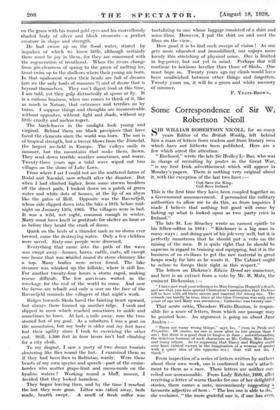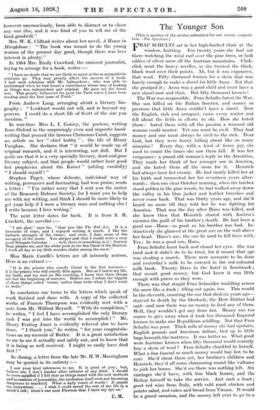Some Correspondence of Sir W : Robertson Nicoll S IR WILLIAM ROBERTSON
NICOLL, for so many years Editor of the British Weekly, left behind him a mass of letters from readers and from literary men which have not hitherto been published. Here are a few which arrest the attention. "Enclosed," wrote the late Sir Hedley Bas, who was in charge of recruiting by poster in the Great War, "is my first Irish advertisement which will appear in Monday's papers. There is nothing very original about it, with the exception of the last two lines :- -'God Save the King.
God Save Ireland.'
This is the first time they have been coupled together on a Government announcement. I persuaded the military authorities to allow me to do this, as from inquiries I made I believe that nothing but good will come by linking up what is looked upon as two party cries in Ireland." The late St. Loe Strachey wrote an earnest epistle to his fellow-editor in 1)14: "Kitchener is a big man in many ways; and doing part of his job very well, but it is perfectly monstrous that he should put a veto on the raising of the men. It is quite right that he should be supreme in regard to training and equipping, but it is the business of us civilians to get the raw material in great heaps ready for him as he wants it. The Cabinet ought to refuse to forego their right in this respect." The letters on Dickens's Edwin Drood are numerous, and here is an extract from a note by Mr. B. Matz, the eminent Dickensian :— "I have just read your reference to Miss Georgina Hogarth's death, and see that you have quoted Chesterton's assumption that Dickens fell in love with all three sisters and married the wrong one. The remark can hardly be true, since at the time Georgina was only nine years of age and Mary was seventeen ; Catherine was twenty-one." That acute critic, Theodore Watts-Dunton, is respon- sible for a score of letters, from which one passage may be printed here. An argument is going on about Jane Austen :— "There are many wrong things," says he, "even in Pride and Prejudice. Of course, no one is more alive to her genius than I am ; but there is a good deal to forgive in Jane • notwithstanding the delicious humour of such characters as Mr. &Rine, Min Bates, and many others. As to supposing that Darcy and Bingley could ever have existed except in the imagination of a woman of genius with a queer idea of the opposite sex ; that will not do, think."
From inspection .of a series of letters written by authors about their own work, one is confirmed in one's attach- ment to them as a race. These letters are neither con- ceited nor unreasonable. From Lady Ritchie, 1899, after receiving a letter of warm thanks for one of her delightful stories, there comes a' note, unconsciously suggesting a favourite adjective of hers: "The less one is able to do," she- exclaims, "the more grateful one is, if one has ever, however unconsciously, been able to distract or to cheer any one etse, and it was kind of you to tell me of the kind goodwill."
Mrs. W. K. Clifford writes about her novel, A House in Marylebone : "The book was meant to do the young women of the present day good, though there was love interest in plenty."
In 1904 Mrs. Emily Crawford, the eminent journalist, trying to arrange for a book, writes :— " I have no doubt that we are likely to agree as far as sympathetic relations go. They may greatly affect the success of a book. I had such relations with Mr. Labouchere ; who was able to understand when he had found a contributor whose way of looking at things was independent and original. He gave me the freest rein. This greatly influenced for good the Paris notes I have been sending since the first issue of Truth."
From Andrew Lang, arranging about a literary bio- graphy: "Lockhart would not sell, and is beyond my powers. I could do a short life of Scott of the size you mention."
In war-time Miss L. I. Guiney, the poetess, writing from Oxford in the surprisingly even and unpoetic hand- writing that penned the famous Christmas Carol, suggests an article on her "chief hobby " : the life of Henry Vaughan. She declares that "it would be made up of original research, and it is interesting, not dull. But I quite see that it is a very specially literary, dead-and-gone literary subject, and that people would rather hear good hot prophecies about the Kaiser" (adding candidly) "I 'should myself ! "
Stephen Paget, whose delicate, individual way of writing, persuasive and fascinating, had won praise, sends a letter : "I'm rather Sorry that I sent you the notice of the Research Defence Society, for I want you to help Me With rnk Writing, and think I should be more likely to get your help if I were a literary man and nothing else! I write because I love writing."
The next letter dates far back. It is from S. R. Crockett, the novelist :— " I am glad," says he, "that you like The Red Axe. It is a favourite of mine, and I enjoyed writing it much. I like the barbaric strength of the times ; and even, I fear, some of the savagery of the deeds. You always said that I would write a very good Newgate Calendar . . . well, there is something in it ! Sawney Bean pleases me, and the white pork in the Sea Chest of the Raiders. I work all day in my little wooden chalet among the snow."
Miss Marie Corelli's letters are all intensely serious. Here is an extract :— "It is the priests who crucify Christ in the first instance— it is the priests who will crucify Him again. But as I fasten my life, my faith, and my soul on His teaching, I know that these things are but the beginning of sorrows. Believe me, I refuse the biggest of these things called 'terms,' rather than write what I don't want to write."
In conclusion, one turns to the letters which speak of work finished and done with. A copy of the collected works of Francis Thompson was evidently sent with a note from Mr. Wilfred Meynell. "With its completion," he writes, "I feel I have accomplished the only literary task I was put into the world to accomplish ! " Mr. Henry Festing Jones is evidently relieved also to have done. "I thank you," he writes, "for your congratula- tions on my memoir of Butler. It is a great satisfaction to me to see it actually and safely out, and to know that it is being so well received. I might so easily have died first ! "
In closing, a letter from the late Mr. H. W. Massingham may be quoted in its entirety :— I saw your kind references to me. It is good of you ; but, believe me, I don't hanker after tributes of any kind. I should be more satisfied if I felt that as things stand with the new methods and necessities of journalism, the profession itself were not becoming dangerous to mankind What a daily vomit of words ! It appals me everywhere . . I wish I could spend the rest of my life in a monk's cell; there's one near Florence that I have my eye on."
C. M.

































 Previous page
Previous page